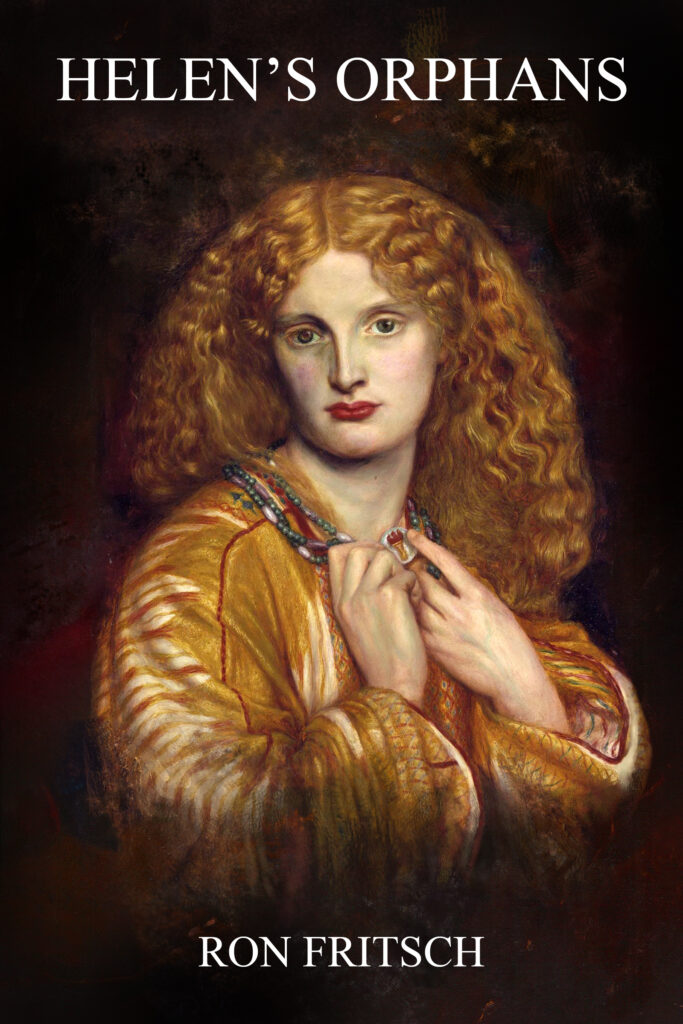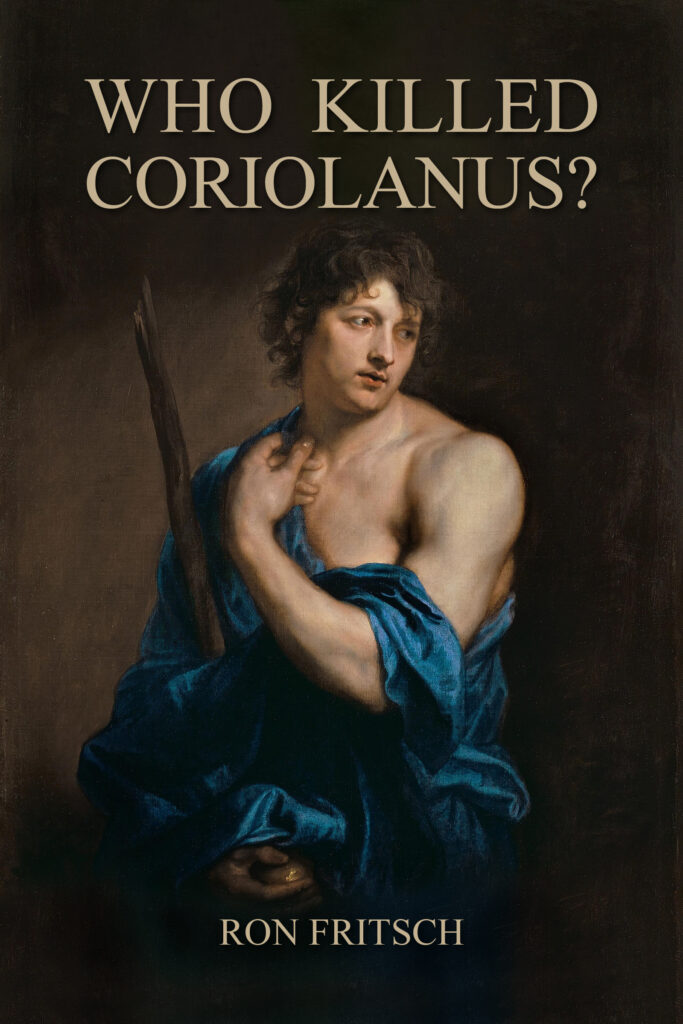Who Killed Coriolanus? Ron’s tenth novel, published in 2021, is the sequel to his ninth novel, Helen’s Orphans, published in 2020, in his two-novel Troy to Rome series.

Did Helen choose to run off to Troy with Paris, or did he force her to go with him? Two orphans of the Trojan War, the tragic conflict Helen’s elopement or abduction precipitated, search for the answer to one of the oldest questions in history—and discover much more.
Helen’s Orphans was the winner of the gold medal in the LGBTQIA+ category of the 2020-2021 Reader Views Literary Awards.
Audiobook and ebook editions of Helen’s Orphans are for sale on Google Play Books for $2.99 each. A paperback edition is for sale on Amazon for $9.99. An ebook edition is for sale on Amazon and other online bookstores for $2.99.
The first chapter and more are free to read with Amazon’s “Look Inside” feature.
Reviews (to read the full review, please click on the link at the end of the excerpt):
“Tender. Compelling. A dazzling tale. History, myth, intrigue, and long-buried secrets mark this beautifully told tale. Fritsch’s extraordinary storytelling abilities shine as he brings to life the larger-than-life heroes and villains of Trojan war mythology. His portrayal of Agamemnon’s political ambition, Hector’s obliviousness to impending danger, the ill-fated duel between Hector and Patroclus, the showdown between Achilles and Hector, the tragic death of Paris all are evoked with skill and passion, as are individual struggles and personal conflicts. Helen is a greatly torn woman whose beauty and personal choices have tragic consequences on an epic scale. Fritsch is at his strongest when he portrays Helen as the gentle compassionate royal who makes it her life purpose to help the less fortunate orphans. The great mythic war between Trojans and Greeks is portrayed with skill and precision. The first-person narrative told in Helen and Timon’s voices is engrossing, and the continuous surprising reveals keep the reader invested throughout. The skillfully evoked era and meticulously researched period details, combined with the crisp, straightforward prose and smoothly paced narrative make for a page-turning story pulsing with romance, sacrifice, conspiracies, betrayals, and battles. Lovers of Greek mythology and historical fiction won’t want to miss this one.” The Prairies Book Review
“This novel offers a revisionist version of the Trojan War alternatingly narrated by Helen and a teenager in the Sparta orphanage that the beautiful woman supports. Almost all of the characters, conveniently identified upfront, in Fritsch’s novel can be found in Homer’s The Iliad, but this is not an adventurous war tale extolling the glory of great warriors. And whereas in the traditional story the jealousies and pettiness of the Greek gods and goddesses played key roles in fomenting the war between the Greek kingdoms and the walled city of Troy, they are virtually absent in this narrative. It is human avarice, blood lust, arrogance—and love— that propel Fritsch’s anti-war story. Timon, a 17-year-old orphan, introduces himself to readers and begins the narration. It is 18 years after Helen (“the face that launched a thousand ships”), on what was to be the day of her marriage to King Menelaus, sailed away from Sparta with the Trojan Prince Paris, precipitating the 10-year sacking of Troy. Most of the children in the Sparta orphanage lost their parents in that war. Only Timon is of totally unknown parentage. As a young child, he bonded with Lukas, another orphan his age: The two were “always side by side like a pair of young oxen.” Now, they are lovers and musical soul mates, committed to spending their lives together. Singers and eventually composers, they write ballads mourning the tragic aftermath of an unnecessary war. Their love story offers the most joyous, tender, and poignant sections of the tale. Fritsch quickly sets up the back-and-forth narrative pattern for the imaginative novel, immediately leaping 18 years into the past and handing narration over to Helen. She has just arrived in Troy with Paris and asserts that she does not want to be returned to Greece. Helen is convinced that the Greek kings would never be so foolhardy as to start a war over her. Readers witness the battles through the eyes of this young woman who has allegiances to both sides but is determined to help the Trojans defend their city. Late in the tale, the author offers readers a surprise. Proficient, modern prose and dialogue, enhanced by lifestyle details, make an ancient epic especially accessible. An enjoyable, inventive Trojan War tale with an intriguing final twist and a serious message.” Kirkus Reviews
“Timon and Lukas emerge as compelling characters. They share touching moments, such as when they sing together and discover a mutual love of music, and their eagerness to question Helen (“Did you find Paris attractive?”) is relatable. Fritsch crafts a detailed and immersive fiction that is charming in its minute detail. Helen’s point-of-view passages give the legend charm and agency. With an appeal to audiences versed in Greek myth, Fritsch’s new spin on a timeless tale will draw in readers with his sympathetic characterization and original inventions. Takeaway: A novel approach to an established classic, with an alternate ending that will please fans of Greek mythology.” BookLife
“Fritsch spins a complex web of secrets and revelations that keep the reader engaged throughout. His plot lines are constantly moving forward to an inevitable collision. His ability to objectively examine alternative angles of a classical work is commendable.” The US Review of Books
Helen’s Orphans was the winner of a finalist award in the 2021 Book Excellence

Who Killed Coriolanus? (published in 2021) is a sequel to Helen’s Orphans in Ron Fritsch’s Troy to Rome series. Both novels can be read on their own, but (spoiler alert) Who Killed Coriolanus? gives away the ending of Helen’s Orphans.
Timon, who grows to adulthood in a Greek orphanage after the Trojan War, learns he’s the sole surviving member of the Trojan royal family. He and his Greek companion Lukas receive an invitation to visit republican Rome, the city the Trojan survivors of the war have founded. Charmed by their prospective host’s son Marco, they sail with him to Rome.
Their host, Marco’s oddly protective father, is the military hero Coriolanus. Soon after his guests arrive, he involves them in his anti-republican schemes—which might include a civil war.
Who Killed Coriolanus? has received a bronze medal in the LGBTQIA+ category in the 2021-2022 Reader Views Literary Awards. It is also a finalist in the LGBTQ fiction category in the 2022 Book Excellence Awards.
Reviews (to read the full review, please click on the links at the end of the excerpt):
“With the power of other historical works such as I, Claudius, this book transports its audience into the past. The book’s magic lies in its alternating narratives, which give readers multiple perspectives on the same situation or event. While modern scholars often debate the legitimacy of Coriolanus’ story, this book feeds on the myths and legends surrounding the general. The book’s focus on the common people and the often nefarious politics behind elections makes it a relevant read that reminds readers that history lies not so far from the present in regard to human nature and its motivations. This book takes the best elements of historical fiction and a mystery thriller and combines them to form an engaging read perfect for history lovers of all ages. Even those unfamiliar with the Roman era of history will find its plot easy to follow.” The US Review of Books
“The novel involves politics on a grand scale. Manipulation, deception and treachery are all incorporated into this story. Readers will enjoy stepping back into the Troy to Rome series. Once again Ron Fritsch has created an amazing story with a compelling, intricate storyline which will be enjoyed by all.” Reader Views
“Brilliantly constructed and richly detailed. Stunning. Fritsch returns with this deeply engrossing stand-alone sequel to Helen’s Orphans, taking readers on an exhilarating journey laced with sinister motives, manipulations, and intrigues. Fritsch’s vivid rendering of the Roman era is noteworthy for his atmospheric use of historical facts, but the book’s emotional punch comes from its portrait of a young man growing into adulthood as he takes responsibility for his friends’ lives. Fritsch’s language is simple yet lyrical and his pacing swift. He describes emotionally charged, speedy actions excellently while making good use of history, myth, and legend. Fritsch’s straightforward prose, vivid imagery, and uncomplicated dialogue create a suitably ominous atmosphere, and the plot advances at a swift pace, keeping readers invested. Readable, well crafted, and thoroughly absorbing, the novel makes for a winner.” The Prairies Book Review
“Set in the aftermath of the Trojan War, Who Killed Coriolanus? is an engrossing and sensuous novel. Fritsch’s crystalline prose helps familiarize us with the heady political climate of the period, while the contemporary, colloquial dialogue brings the three lovers as close to the reader as they are to each other. By favoring the personal over the grand, Fritsch succeeds brilliantly.” Book Excellence (no link available)
Audiobook and ebook editions of Who Killed Coriolanus? are for sale on Google Play Books for $2.99 each. A paperback edition is for sale on Amazon for $9.99. An ebook edition is for sale on Amazon and other online bookstores for $2.99.
The first chapter and more are free to read with Amazon’s “Look Inside” feature.